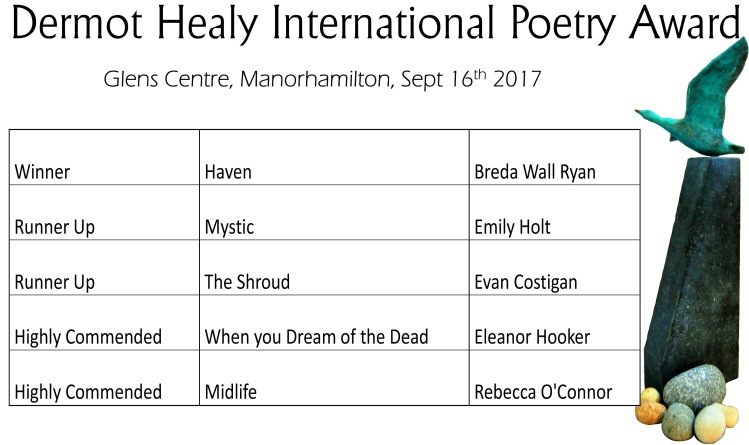

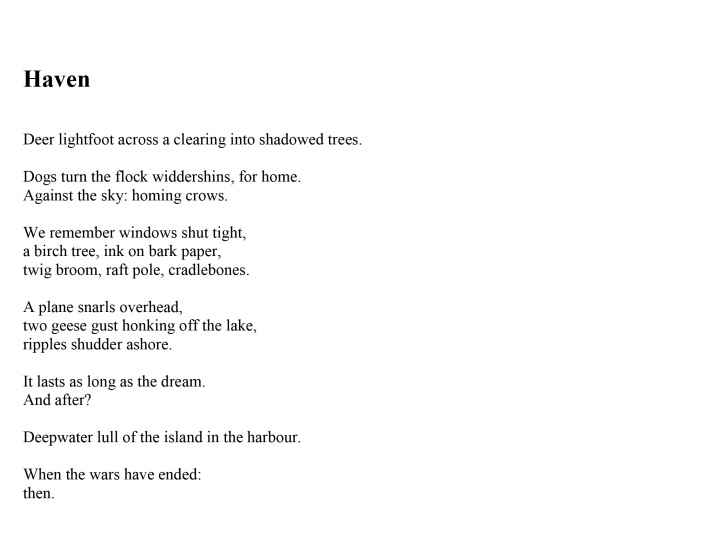
| POEM | POET |
| Baltimore Beacon | Roisin Kelly |
| Bees at Swann’s | Winifred McNulty |
| Bow Side | Jenny Pollak |
| Dragon Pearls | Majella Kelly |
| Early Music | Peter Sirr |
| Finally | Felicia McCarthy |
| Haven | Breda Wall Ryan |
| Midlife | Rebecca O’Connor |
| Motherhood in Euclidean Terms | Dawn Watson |
| Mystic | Emily Holt |
| Sea Change II | Jenny Pollack |
| Spectre | Marian Kilcoyne |
| The Heartbeat | James Peake |
| The M1 to Belfast | Dawn Watson |
| The Resonance of Shells | Orla Fay |
| The Shroud | Evan Costigan |
| This is not a Poem | Christine Valters Paintner |
| To That Other Me behind The Looking Glass | Patrick Holloway |
| When you Dream of the Dead | Eleanor Hooker |
| POEM | POET |
| A Quire of Stones | Winifred McNulty |
| Aughawillan | Karen McDonnell |
| Avondale Avenue | Winifred McNulty |
| Baltimore Beacon | Roisin Kelly |
| Banna Strand | Alan Weadick |
| Beautiful Swimmer | Eamonn Mahoney |
| Bees at Swann’s | Winifred McNulty |
| Beyond Reason | Audrey Molloy |
| Black Rocks | Enda Wiley |
| Bogeyman | Nessa O’Mahoney |
| Bow Side | Jenny Pollack |
| Collins Gem | Sharon Black |
| Cornflower Blue | Maurice Devitt |
| Dragon Pearls | Majella Kelly |
| Early Music | Peter Sirr |
| Earthmusic | Eithne Lannon |
| Emasculate | Majella Kelly |
| Endgame | Geraldine Mitchell |
| Finally | Felicia McCarthy |
| Fish Bake | Audrey Molloy |
| Haven | Breda Wall Ryan |
| He Needed to Know | Steven Pelcman |
| In Diquini | Aidan Rooney |
| Keeper | Gavan Duffy |
| Listening for Code | Edel Burke |
| Loughshinny Bay | Eithne Lannon |
| Marilyn, in the Channel Islands | Ray Givans |
| Midlife | Rebecca O’Connor |
| Motherhood in Euclidean Terms | Dawn Watson |
| Mystic | Emily Holt |
| Oasis | Connie Roberts |
| Off Season | Noelle Sullivan |
| Poet’s Grave | Susan Flynn |
| Say Goodbye, Catullus | Peter Sirr |
| Sea Change II | Jenny Pollack |
| Sionnach | Elizabeth Laragy |
| Sisyphus Decides | Ciaran Parkes |
| Sour Milk | Lucetta Moelwyn Hughes |
| Spectre | Marian Kilcoyne |
| Still Never | Ben McGuire |
| Storm Light | Peggie Gallagher |
| Stretched Beauty | Eamon McGuinness |
| Swailing | Sharon Black |
| Talking in Pictures | Karen O’Connor |
| The Eye in the Wall | James Peake |
| The Gauntlet Road | Kathleen McCracken |
| The Heart Uncut | Marian Kilcoyne |
| The Heartbeat | James Peake |
| The M1 to Belfast | Dawn Watson |
| The Old Man and the Portrait | Afric McGlinchey |
| The Pearl Diver | Dermot Lahiff |
| The Reading | Andrew Jamison |
| The Resonance of Shells | Orla Fay |
| The River Finch | Michael O’Connor |
| The Shroud | Evan Costigan |
| The Sun is one inch above the horizon | Dawn Watson |
| The Women’s Circle | Paul Bregazzi |
| Thing | Rebecca O’Connor |
| This is not a Poem | Christine Valtners Paintner |
| To that Other Me behind The Looking Glass | Patrick Holloway |
| Transgression | Jackie Gorman |
| Triangle | Eithne Lannon |
| Tuam | Roisin Kelly |
| Vertigo at Killadoon | Michael Farry |
| When We Were Foreign | Emily Holt |
| When you Dream of the Dead | Eleanor Hooker |
| Winter Picnic | Evan Costigan |
| Words of Silence | Noel Monahan |
| You can’t blame the water | James Finnegan |
Can you describe how you approach your work daily or weekly. Do you have specific times of the day when you write, a particular place.
Paper continues to be useful because it preserves mistakes in a way that the word processor does not. Very early, just after waking up and just after swimming, before anyone has said anything – that is the optimal scenario … which hardly ever happens. The rule I abide by is that I try to write every day, even if it isn’t working out, or even ‘especially if it isn’t working out’. I had a work room that a growing son needed for a bedroom … that may become a work room again. A place acquires a certain amount of charm if a poem has been written there. The kitchen table; the car. Didn’t Derek Mahon say you can do it in your head?
There’s a house in Mayo that I associate with having written a poem or two in; another in Monaghan; another in Galway – safe houses, after a fashion. By the time I’m finished, I hope to have a whole invisible network of them throughout the country.
In your address to post primary students at Poem for Ireland 2016 you explore the idea that poems might come from ‘a store, a warehouse, a repository’. Could you describe what this place might look like, smell like in your minds eye and where might it be?
I might have been misquoting Michael Longley who famously said that if he knew where poems came from, he’d go there. It’s a nice conceit to think of a repository … but little more than a conceit. Put to the pin of my collar I would say that that place smells and looks like any place a poem might get written.
Can you describe your childhood, when did you realise you were a poet and what events or people helped you to encourage your poetry.
It’s known as ‘the p word’ in our house; I am profoundly disinclined to use it. ‘Maker of poems’ would be more useful as a description of what I’m interested in trying to do.
I grew up in a village on the edge of a bog in Tipperary, described in The Waterford News in 1851 as a village ‘which the casual visitor never enters and which offers nothing to excite the interest of a stranger, either as regards its local situation or the attractions of the neighbourhood. It is approached … through a wild and extensive bog where, in winter, a chill mist obscures the view and makes it impossible to keep warm even if wrapped up in a Russian dreadnought and, when at length, some avenues of dark fir are approached, it is found that they still lead to desolate vistas of bog, and they only render the landscape even more desolate’ – where I, and my siblings – particularly a brother – spent from Easter to September during our formative years saving turf. That work turned out to have been an education that stands to me yet.
The first real writer I ever met was Anne Kennedy, in Galway, in the mid-1990s. She put books my way and hinted that sticking at the writing might be a good idea. Her encouraging word back then meant a lot, and I continue to be grateful to her.
Peter Fallon of The Gallery Press has given my work his attention over the years, and his close reading and considered approach to the making of a book has been an experience that I have benefited greatly from.
I have a friend who is a film and documentary maker and another friend who is an actor – they inspire me by how they go about their work with wholeheartedness and passion. I try to learn from them.
A scholar in a reputable Irish university publication suggested, in a review of my first collection, that ‘there is surely nothing to look forward to in Tom French’s future collections’ – which struck me as a bit harsh at the time, but which has since proven quite motivational.
I’ve learned, with time, to steer between the good and the bad word.
Would you agree that the job of librarian is a good match for a ‘Maker of Poems’? How has working in this field enhanced your poetry.
Every day is a bus man’s holiday, particularly if you work in the area of Local Studies which puts one in the way of books and people who are slightly outside the normal run. I have learned a lot from them and much has found its way into poems that might not have if I were in the more public end of the service.
How important is the silence and what happens inside it? Is it possible to produce good work if there are background activities and sounds?
A long poem that appeared in my first book was mostly written on a bicycle between Dolphin’s Barn and Belfield. (I remember a policeman at lights in Ranelagh shouting out to me, ‘The lights are for everyone’ which struck me as a beautiful thing for a policeman to be shouting in the middle of the street in broad daylight). I nearly embraced him.
It’s important to be distracted. Gaguing the right degree of distraction might be an art in itself, some delicate balance between silence, distraction and attention, and then the poem coming into being to amber it all.
Francis Harvey said a lovely thing that stuck with me – ‘you cannot worry a poem into being.’ Nobody knew better than he. I carry his ‘Blessings’ with me – ‘Yesterday, for some reason I couldn’t understand ….’
Can you explore the idea of ‘noble failure’
I dread to admit that I may actually be an authority. If I did not fail to get onto Mastermind the subject of ‘noble failure’ would have to be my chosen one.
It was Ledwidge who wrote that ‘a noble failure is not in vain.’ I know it was the Easter Rising he had in mind, but where writing is concerned I’d be inclined to go further. The whole enterprise of trying to write poems, it seems to me, is based on failing and failing again and failing better again. There are poems I wrote 20 years ago that are better than the ones I am trying to write now. There are poems which I am trying to write now which are better than the ones I wrote 20 years ago. If I could say why that is, I might consider using the word ‘poet’. Because I can’t, I don’t. Eventually, I have surrended to the not-knowing and the uncertainty and the hope of the next poem.
Have you ever experienced writer’s block?
My harshest critic might suggest that one has to experience ‘writing’ before one can experience the attendant ‘block’ …
I try to be workmanlike about it – if the writing’s going well I try to stick at it. When it’s not, I take that as a sign to run the dog. Generally, the condition the dog is in is a fair indictation of how well the writing is going.
How do you activate the muse?
The hangover, as many’s the writer before me has known, has its uses … but the body can’t be writing cheques that the mind can’t cash, so I don’t rule out the utility of the peace that can be got from swimming and walking and other healthy activities.
Hearing the poem straight from the horse’s mouth is something I have always found stimulating. Sometimes for the pleasure of recognition, and sometimes poems I have never heard before.
What poets have influenced your work and your style. Who do you return to again and again?
Montague, Oswald, Hughes, Mary Oliver, Dickinson, Michael Longley, Colette Bryce, Fred Voss, Sharon Olds, James Wright, Paula Meehan, Michael Hartnett, Seamus H, Eavan Boland, Samuel Menashe, Kathleen Jamie …
The list, like the bog, is bottomless.
What new and emerging poets would you recommend?
I’d recommend running the risk of failure and trying to read everything …
The Forward anthologies over the past few years have pointed me towards writers I might not otherwise have heard of.
D.A. Powell, Victoria Kennefick, Jonathan Edwards, Doireann Ní Ghriofa, Padraig Regan, Fred Voss, A.E. Stallings, Ruth Stone. Matt Rasmussen’s Black Aperture is a book I would recommend, one I don’t envy him having had to write, and I look forward to what he does next.
Soraya Ricalde is a studio holder at Leitrim Sculpture Centre in Manorhamilton, Co. Leitrim. Here, she runs her fine jewellery business alongside with ‘Counties of Ireland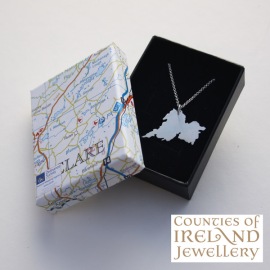 Jewellery’ design which she co-founded with Marion Fink of MT Frame Sligo. She also engraves the winners names on the Dermot Healy Poetry Award Trophy
Jewellery’ design which she co-founded with Marion Fink of MT Frame Sligo. She also engraves the winners names on the Dermot Healy Poetry Award Trophy
Can you describe your childhood in Spain, and what about it piqued your creativity? I grew up in Santander, a seaside city in the North of Spain. I went to a very open school where they exposed us to wonderful art and culture experiences that really infused and developed creativity. They call it ‘ the artist’s school’ because all the creative and artist kids that come out. Always surrender by nature. Spending summer on the beach and winter in the mountains, going trekking or skiing. Wonderful times! So my designs have a strong influence from nature, very organic.
What was it about the life of a jeweller that made you realise this was what you wanted to do? I have been painting since I was 7 years old. And when the time came to go to college everyone expected I’d go to art college but I thought it would be very difficult to make a living from art. So I did a Marketing and Advertising Degree. By the time I finished college I didn’t really like it but ended up working in different offices but I didn’t enjoyed it at all. So searching for something new I went to a goldsmith course that I loved and I decided then to go back to college and do jewellery. I love working with metal, it is creative and saleable. Perfect combination. I was fascinated straight away by the tools, equipment and techniques.
Why did you choose to settle in Ireland’s North West? My partner’s job was the reason we came. We always loved the North West and wanted to live here but jobs were always an issue. So when the opportunity came along we were delighted.
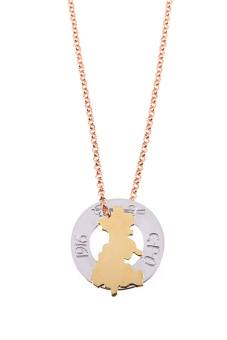 How has living in north Co. Leitrim affected your life and creativity? All my designs have a strong influence from nature. To be surrounded by mountains, lakes, the sea it’s a great inspiration. The North West of Ireland is very similar to the North of Spain in many ways. I love it here.
How has living in north Co. Leitrim affected your life and creativity? All my designs have a strong influence from nature. To be surrounded by mountains, lakes, the sea it’s a great inspiration. The North West of Ireland is very similar to the North of Spain in many ways. I love it here.
Take us through a typical working day. My day in the studio is busy. First thing I do is paperwork, checking emails, social media, pay bills, order materials… Then I’ll talk to Marion Fink, my partner in the Counties of Ireland Jewellery business. We’ll go through everything that has to be done that day. And then I’ll start bench work, whatever it’s the next job, it could be repairs, commissions, Counties, or some of my designs. I have an open studio so during the day customers will be going in and out. Also I draw a lot as every design starts drawing and planning all the sizes and materials on paper.
Can you explain how the idea for ‘Counties of Ireland Jewellery’ came along and how did you get the products off the ground? All started one day in my house. Anthony my partner came out of the shower and he told me that he had a jewellery idea. Both of us thought that was a great idea as Irish people have a strong connection with their Counties. So I began to create the collection and sell them in my studio. At that time I was running a shop with other makers in Sligo. Nationwide from RTE television came to visit us all in our studios. So mentioned the new project I was working on, The Counties. It had a great response and I got different orders, one of them was a full map of Ireland to be framed. It’s when someone recommended Marion Fink of MT Frame Sligo that I went to meet her. She framed the piece beautifully and she mentioned then that it would be a great idea for a jewellery collection. I told her this is what I was working on, The Counties. It had a great response and I got different orders, one of them was a full map of Ireland to be framed. It’s when someone recommended Marion Fink, MT Frame Sligo and I went to meet her. She framed the piece beautifully and she mentioned then that it would be great idea for a jewellery collection. I told her this is what I was doing. Trying to bring it to the next stage and promote it widely. She proposed working together and creating a partnership. We set up the business Counties of Ireland Jewellery in 2012. Since then the business has just got better and better, both of us bring something to the business.
Judging from your experiences, how would you advise someone who wished to launch a jewellery product now? I would advise to be motivated, patient, persistent, research, learn and inform yourself well. Believe and go for it.
In what direction would you like to steer the company now that it is established? We would like to continue the good work. Expand, create more sales abroad and reach the Irish Diaspora all around the globe. And hopefully, in the future, create some 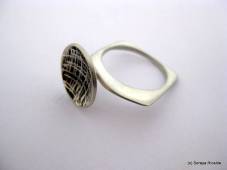 employment in the North West of Ireland.
employment in the North West of Ireland.
In your bespoke work, do you have a preference for working with different metals and gemstones? I love working with metal in general. Just love the process but my favorite metal to work is gold. Gemstones, diamonds because they are really strong so they are great to work on .
What is it like for a foreigner working independently in the creative sector in Ireland at this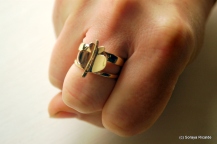 time? Working as self-employed is challenging for everyone. The creative sector is even more vulnerable, probably the same for all of us.
time? Working as self-employed is challenging for everyone. The creative sector is even more vulnerable, probably the same for all of us.
How does working in close proximity with other artists and craftspeople at LSC enhance your practice? Working from my studio in the LSC is great. I think it’s really good to be around other creative people from different disciplines as I think you create better. It’s brilliant support and a great network.
Check out Soraya’s beautiful work on the links below
This weeks interview is with 2017 Dermot Healy Award Judge Vona Groarke. Vona has published seven collections of poetry with Gallery Press, the most recent being X (2014) and Selected Poems, awarded the Pigott Prize for the best book of poetry by an Irish poet in 2016. Her book-length essay on art-frames, Four Sides Full, was also published in 2016. Her poems have recently appeared in The New Yorker, Ploughshares and The Threepenny Review. A former editor of Poetry Ireland Review, she currently teaches poetry at the University of Manchester in the U.K.
Describe your approach to writing. Is there a routine/ritual? Not really: I write whenever I get the chance, but ‘getting the chance’ tends to involve quite a bit of preparatory reading and thinking and daydreaming, so there’s quite a bit of space needed between living and writing, a generous buffer zone.
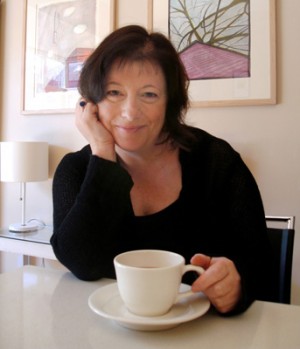
How have you seen your own poetry evolve over the years? ‘Evolve’ seems to suggest some sort of creeping improvement or development, which I’m not sure I’d want to claim. It changes, I like to think, book by book. Otherwise, I doubt I’d see the point in going on.
Have you ever been surprised or shocked at what you have written? If I’m not surprised by what I’ve written, I strike through or delete it. I’m not interested in finding out what I already know: poetry is not about affirmation. For me, the surprise is the fun of the thing. That’s what keeps the work worth the effort (if it is), the not knowing what comes next.
What are you particularly proud of in terms of your work and career? That I’m still requiring my next book to be better than my last, and that I’m actively working towards that.
Which poets do you return to? And which emerging poets are your ones to watch right now? It’s a good time for poetry. I’ve lately enjoyed many collections by both emerging and established poets, including Ocean Vuong’s Night Sky with Exit Wound, Rachael Boast’s Void Studies, Jacob Polley’s Jackself, Anne Carson’s Float, Denise Riley’s Say Something Back, and Louise Glück’s Faithful and Virtuous Night, among others.
How has teaching affected your practice? Do you think it is good for poets to have other work? I don’t know that I know anything about what’s good for poets. Well, maybe that it’s best if they don’t go hungry, or sleep in hedgerows or on the streets. (They’re marvellously like non-poets in that respect.) Teaching means I have an income, it’s as simple as that.
Literary journals are both struggling and thriving currently. What is your take on this, how important is the literary journal in its physical format in modern times? It’s hugely important that aspiring poets read good poetry, and most good poetry, even these days, still comes to us via (initially) magazines or journals, and then (eventually) through books. There’s no substitute for print medium when it comes to poetry, nothing that knows half so well how to respect the physical dimensions of a poem, its materiality and selfhood, or indeed, its independence from the poet and the poet’s person, which is so necessary.
What does acknowledgement in the form of awards/prizes write-ups mean to you as a 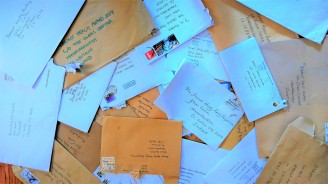 poet? It’s nice when / if it happens, but it doesn’t much help with the real business of solving the next poem, or the one after.
poet? It’s nice when / if it happens, but it doesn’t much help with the real business of solving the next poem, or the one after.
As a judge, what will you be looking for in a winning poem? Without wanting to impinge on a poet’s personal style, what advice would you give to poets wishing to enter this year’s award? The most successful poems tend to balance a sense of their own inevitability with another, competing a sense of how formal and linguistic choices have facilitated that inevitability. They are successful and compelling because they pay attention to the mechanisms of their own coming into being. They listen to themselves and they see themselves on the page, and they are alive to the ways in which energy moves through them. They’re not reports or verdicts, and they tend to be more interested in procedure and process than in proving some point or other, or having opinions or advice. So, my advice to poets would be: keep your focus on language always, and don’t feel overly committed to a narrative standpoint – let sound and imagery do their (important) jobs also.
What are your thoughts on Dermot Healy the writer: Although I was always very happy to see Dermot at a festival or event (he was always a kind man, and could be wicked good fun), I’d say I was more of a fan than a pal. I consider Dermot Healy to be one of the great prose stylists of our time. I use extracts from his work to show students how it’s done, how you can move swiftly across narrative moments, without having to sacrifice sensitivity or depth of feeling, or psychological insight. I love how inventive he is with prose, how he makes the gaps between speech and narrative description declare so very much. But he wasn’t far behind in terms of poetry. The last time I saw Dermot was at the Athlone Writers’ Festival in October 2013, when we read and were interviewed on stage together. Afterwards, he showed me a translation from Irish he’d been working on. It was beautiful, with the light touch and lyric grace typical of his poems. Something that Dermot could do, that so few of us can do, is be funny in a poem. Dermot, really, could do it all. His work stands as special, accomplished and sophisticated, knowing exactly what it was for, and how it would get there. There’s not a writer I admire who doesn’t admire and learn from it, and enjoy it to the hilt.
Tell us a bit about yourself Donna. I am a retired nurse but not a retired person. My years in hospice care influenced me deeply but in order to write about it fully, honestly, I had to leave it. Now I live on a small homestead with my husband in Central Illinois where a large part of my day is sweaty, dirty, and mundanely peaceful.
You speak of your poems ‘feeling jealous’ if you write in other genres. How personal is your work to you, where does the creativity come from and how do you know when it is fully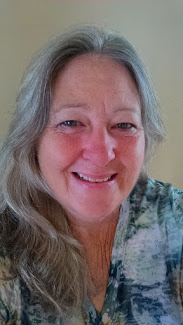 formed? At age 58, with four children and four grandchildren, life is one huge hodge-podge of experiences. It’s all “personal”, so much so that I have to reign myself in at times as my skin grows thicker and my filter on life gets thinner. I tend to write exactly what I am thinking at that moment, which can be rudely entertaining but not always useful as a poem. I feel most creative when left alone, I thrive on solitude, but creating in a vacuum can be dangerous, limiting, and in my case leads to only half-formed ideas. Thus, I need my family, and friends to keep me solid, to make my work real and less self-centered. It’s the irony of my life.
formed? At age 58, with four children and four grandchildren, life is one huge hodge-podge of experiences. It’s all “personal”, so much so that I have to reign myself in at times as my skin grows thicker and my filter on life gets thinner. I tend to write exactly what I am thinking at that moment, which can be rudely entertaining but not always useful as a poem. I feel most creative when left alone, I thrive on solitude, but creating in a vacuum can be dangerous, limiting, and in my case leads to only half-formed ideas. Thus, I need my family, and friends to keep me solid, to make my work real and less self-centered. It’s the irony of my life.
You describe reading poetry while milking cows, can you explain how your environment effects your work. There is a specific language of a farm, a rhythm of animal husbandry that is unknown by those who don’t live the life. The feeding, the watering, the birthing. But if you don’t slow down, if you don’t shut up, you can’t experience it.
Since graduating from the University of Illinois two years ago you have now become a full time poet. Can you explain how this course and its tutors helped your writing. I first attended the U of I at age 17, and flunked out. Too many parties! When I returned four decades later I was ready to learn the craft I had not yet given myself permission to explore. My professors were so ready to teach me. They offered me valuable extra office time and I took it. They suggested additional books to read and I consumed them. They challenged me and pushed me and I had the time of my life. In the summer of 2015 I participated in a study abroad experience at NUIG Galway and those instructors opened my eyes to even more great writers and poets. I am forever grateful.
Do you write every day? Do you see it as a task? How do you approach your practice? Yes. Every day. Sometimes I only get one word in my notebook, but I try to make it a good one. It’s never a task, in fact it’s all I want to do but I have to earn it, the pleasure of it, so I’ll think stupid things like, as soon as I finish feeding the pigs, I’m going to start that poem about Aunt Bernie.
What was the poem/line/verse that made you realise you were a poet too, who wrote it, when did you first encounter it and what did that feel like? Brigit Pegeen Kelly, sadly now deceased, was one of my professors at the U of I. During class one day she said, “There should not be anything not in poetry.” That was a defining moment for me. To know that anything, any experience, any relationship, could and should be part of a poem. Her poem “Song” has the most beautiful imagery, and I find it impossible not to weep each time I read it.
How important are awards/competitions to the poet? We say, they are not important, that 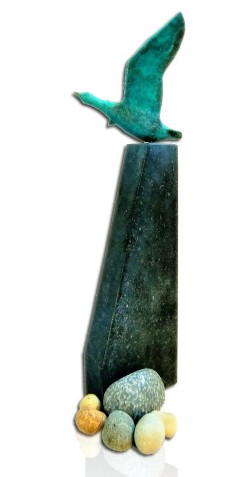 the work must speak for itself, but still, who isn’t thrilled to be recognized for their work? I know I am, but I also know that the 123 rejections one receives AFTER winning a contest or award, are just as valuable. They humble us, center us, pull our heads out of the clouds and make us recognize the value of solid earth again.
the work must speak for itself, but still, who isn’t thrilled to be recognized for their work? I know I am, but I also know that the 123 rejections one receives AFTER winning a contest or award, are just as valuable. They humble us, center us, pull our heads out of the clouds and make us recognize the value of solid earth again.
Can you recommend five literary journals you have submitted or would like to be published in. I am a big fan of MOTH as well as CRANNOG. On this side of the murky pond I love to read The Spoon River Review, The Chattahoochee Review and Bellevue Literary Review.
What modern poets do you admire and can you recommend a volume they have published. I’ve already mentioned Brigit Pegeen Kelly but I also deeply appreciated The Juno Charm by Nuala Ni Chonchu’ir (O’Connor), Selected Poems of Sean O Riordain edited by Frank Sewell, The Mad Farmer Poems by Wendell Berry, and The Beauty by Jane Hirshfield.
Do you have a trusted critic/critics that you test your work on before publication? No. I do not. It is a gaping hole in my writing life. I am still building relationships with other poets, mostly through social media, and over time I’m certain that network will evolve. I plan on attending a few writing conferences this year and in 2018 I will return to school for my MA in writing. It took me over 25 years to build a strong network of support in my nursing career, I expect it will take the same due diligence and hard work to create those relationships in this new career of mine as well.
Read the 2016 Dermot Healy Poetry Award winning poem below
I thread my fingers through your thick hair
still jealous that it never thinned, I settle
my index finger within the soft indentation
behind your too small, too low ear.
Regretfully, I move vertically along your flat,
silent, jugular until my finger catches
on your clavicle, once broken when you fell off
the hay wagon onto February’s resistant surface.
Pulling my hand up and over your shoulder
sharp as a metal plane jutting into the sky,
I recall the arm that held off an erect bull gunning
across the pasture for our youngest son.
Where was I?
Yes, your shoulder, just above a rib cage often
held against me, frame against the thunders
that besieged us, my digits wave in and out,
in and out, in and out of those narrow bones.
I spread my hand wide, snaking it downwards,
my life lines criss cross as I nestle my palm in
that concave hollow sheltered between
your belly and the top of your thigh.
I’m back to your hip and over its crest
to find the leg and the knee and the ankle
which together carried weak calves out of
flooded fields and into shelter.
The same limbs which transported boxy bee
hives with supers, smokers, and new frames
to buckwheat pastures, a trail of disgruntled
workers, humming at your heels.
An interferring head pokes its agenda
into our room. Mother? Are you ready?
No. Not yet.
I begin again, in the soft indentation
behind your too small, too low ear.
Once again the 2017 Dermot Healy International Poetry Award will be held in Manorhamilton during the Inaugural ‘The Fierce Moon’ in the Glens Centre which will celebrate the writings of Dermot Healy.
This years judge is the fantastic Vona Groarke who will judge and present the €1000 first prize and trophy on the 15th September in Manorhamilton.
Closing date for submissions is 31st July.
Entry Details on fiveglens.com
Also while you are here, check out the programme for this years ‘The Fierce Moon’
This years winner of the Dermot Healy poetry award goes to Illinois resident Dona O’Shaughnessy with the the words of our most esteemed judge Kevin Barry below.
While the Coroner Waits
I thread my fingers through your thick hair
still jealous that it never thinned, I settle
my index finger within the soft indentation
behind your too small, too low ear.
Regretfully, I move vertically along your flat,
silent, jugular until my finger catches
on your clavicle, once broken when you fell off
the hay wagon onto February’s resistant surface.
Pulling my hand up and over your shoulder
sharp as a metal plane jutting into the sky,
I recall the arm that held off an erect bull gunning
across the pasture for our youngest son.
Where was I?
Yes, your shoulder, just above a rib cage often
held against me, frame against the thunders
that besieged us, my digits wave in and out,
in and out, in and out of those narrow bones.
I spread my hand wide, snaking it downwards,
my life lines criss cross as I nestle my palm in
that concave hollow sheltered between
your belly and the top of your thigh.
2.
I’m back to your hip and over its crest
to find the leg and the knee and the ankle
which together carried weak calves out of
flooded fields and into shelter.
The same limbs which transported boxy bee
hives with supers, smokers, and new frames
to buckwheat pastures, a trail of disgruntled
workers, humming at your heels.
An interferring head pokes its agenda
into our room. Mother? Are you ready?
No. Not yet.
I begin again, in the soft indentation
behind your too small, too low ear.
There is a kind of cool detachment to this poem that somehow serves to deepen its poignancy. A life is remembered and celebrated in very crisp, very clear language, the images are of everyday work and events but the effect is transporting, and passionate. A fabulous piece.
Delighted to announce the Short List to the Dermot Healy International poetry Award 2016
| While the Coroner Waits |
| Hawk Light |
| Selkie Selfie |
| Leannan si |
| Older |
| Gingko Rain |
| lallach |
| The Pacific |
| Two Hands |
| The Chase |